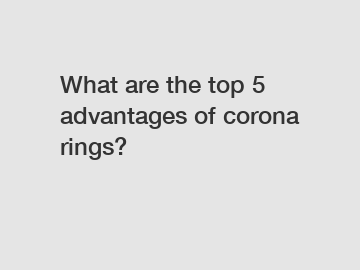Feb. 19, 2024
Electrical Equipment
huaneng Product Page
Corona rings, also known as grading rings or anti-corona rings, are devices made of metallic or semiconducting materials that are placed around high-voltage conductors or insulators to prevent the occurrence of corona discharge. Corona discharge can cause undesirable effects such as power loss, radio interference, and material degradation in high-voltage systems. In this article, we will explore the top 5 advantages of corona rings.
### Stress Control.

Corona rings are essential components in high-voltage systems for stress control. When high voltages are applied to conductors or insulators, electric fields can become uneven, leading to point discharge or corona discharge. Corona rings help to redistribute the electric field, ensuring that the voltage is evenly distributed along the length of the conductor or insulator. By controlling the stress levels in the system, corona rings can prevent premature failure of equipment and improve the overall reliability of the system.
### Reduced Radio Interference.
Corona discharge can generate electromagnetic waves that cause radio interference in communication systems. By using corona rings, the occurrence of corona discharge is minimized, leading to reduced levels of radio interference. This is especially important in high-voltage overhead transmission lines where radio interference can disrupt communication signals and affect the performance of nearby electronic equipment. Corona rings help to maintain a stable electric field around the conductors, reducing the likelihood of electromagnetic interference.
### Increased Insulation Life.
Corona discharge can degrade the insulation of high-voltage systems over time, leading to breakdown and failure. By using corona rings to control the electric field, the insulation life of the system is increased. Corona rings help to prevent the formation of corona discharge, which can gradually deteriorate the insulating material. By maintaining a uniform electric field, corona rings protect the insulation from excessive stress and extend its lifespan, reducing the need for frequent maintenance and replacements.
### Improved Efficiency.
Corona discharge causes power loss in high-voltage systems due to the energy dissipated in the form of light and heat. By minimizing the occurrence of corona discharge with corona rings, the efficiency of the system is improved. The energy that would have been lost to corona discharge is instead utilized for the intended operation of the system, reducing wastage and improving overall energy efficiency. This is particularly important in power transmission and distribution systems where minimizing losses is a key priority.
### Cost-Effective Solution.
Corona rings offer a cost-effective solution for managing corona discharge in high-voltage systems. By installing corona rings, operators can prevent the adverse effects of corona discharge without the need for expensive modifications to the existing infrastructure. Corona rings are easy to install and maintain, making them a practical and economical choice for enhancing the performance and reliability of high-voltage systems. In the long run, the use of corona rings can lead to cost savings by reducing downtime, repairs, and replacements.
In conclusion, corona rings play a crucial role in controlling corona discharge and enhancing the efficiency and reliability of high-voltage systems. The advantages of using corona rings include stress control, reduced radio interference, increased insulation life, improved efficiency, and cost-effectiveness. By incorporating corona rings into high-voltage systems, operators can mitigate the risks associated with corona discharge and ensure smooth operation. Contact us to learn more about how corona rings can benefit your high-voltage applications.
Contact us to discuss your requirements of corona ring vs grading ring. Our experienced sales team can help you identify the options that best suit your needs.
If you are interested in sending in a Guest Blogger Submission,welcome to write for us!
All Comments ( 0 )